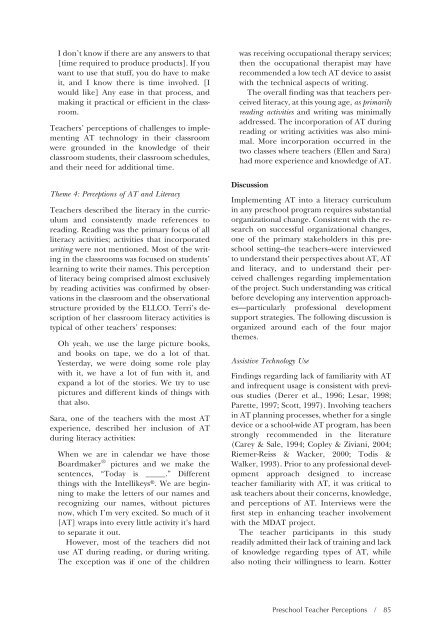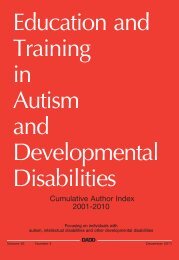Download the Journal (PDF) - Division on Autism and ...
Download the Journal (PDF) - Division on Autism and ...
Download the Journal (PDF) - Division on Autism and ...
Create successful ePaper yourself
Turn your PDF publications into a flip-book with our unique Google optimized e-Paper software.
I d<strong>on</strong>’t know if <str<strong>on</strong>g>the</str<strong>on</strong>g>re are any answers to that<br />
[time required to produce products]. If you<br />
want to use that stuff, you do have to make<br />
it, <strong>and</strong> I know <str<strong>on</strong>g>the</str<strong>on</strong>g>re is time involved. [I<br />
would like] Any ease in that process, <strong>and</strong><br />
making it practical or efficient in <str<strong>on</strong>g>the</str<strong>on</strong>g> classroom.<br />
Teachers’ percepti<strong>on</strong>s of challenges to implementing<br />
AT technology in <str<strong>on</strong>g>the</str<strong>on</strong>g>ir classroom<br />
were grounded in <str<strong>on</strong>g>the</str<strong>on</strong>g> knowledge of <str<strong>on</strong>g>the</str<strong>on</strong>g>ir<br />
classroom students, <str<strong>on</strong>g>the</str<strong>on</strong>g>ir classroom schedules,<br />
<strong>and</strong> <str<strong>on</strong>g>the</str<strong>on</strong>g>ir need for additi<strong>on</strong>al time.<br />
Theme 4: Percepti<strong>on</strong>s of AT <strong>and</strong> Literacy<br />
Teachers described <str<strong>on</strong>g>the</str<strong>on</strong>g> literacy in <str<strong>on</strong>g>the</str<strong>on</strong>g> curriculum<br />
<strong>and</strong> c<strong>on</strong>sistently made references to<br />
reading. Reading was <str<strong>on</strong>g>the</str<strong>on</strong>g> primary focus of all<br />
literacy activities; activities that incorporated<br />
writing were not menti<strong>on</strong>ed. Most of <str<strong>on</strong>g>the</str<strong>on</strong>g> writing<br />
in <str<strong>on</strong>g>the</str<strong>on</strong>g> classrooms was focused <strong>on</strong> students’<br />
learning to write <str<strong>on</strong>g>the</str<strong>on</strong>g>ir names. This percepti<strong>on</strong><br />
of literacy being comprised almost exclusively<br />
by reading activities was c<strong>on</strong>firmed by observati<strong>on</strong>s<br />
in <str<strong>on</strong>g>the</str<strong>on</strong>g> classroom <strong>and</strong> <str<strong>on</strong>g>the</str<strong>on</strong>g> observati<strong>on</strong>al<br />
structure provided by <str<strong>on</strong>g>the</str<strong>on</strong>g> ELLCO. Terri’s descripti<strong>on</strong><br />
of her classroom literacy activities is<br />
typical of o<str<strong>on</strong>g>the</str<strong>on</strong>g>r teachers’ resp<strong>on</strong>ses:<br />
Oh yeah, we use <str<strong>on</strong>g>the</str<strong>on</strong>g> large picture books,<br />
<strong>and</strong> books <strong>on</strong> tape, we do a lot of that.<br />
Yesterday, we were doing some role play<br />
with it, we have a lot of fun with it, <strong>and</strong><br />
exp<strong>and</strong> a lot of <str<strong>on</strong>g>the</str<strong>on</strong>g> stories. We try to use<br />
pictures <strong>and</strong> different kinds of things with<br />
that also.<br />
Sara, <strong>on</strong>e of <str<strong>on</strong>g>the</str<strong>on</strong>g> teachers with <str<strong>on</strong>g>the</str<strong>on</strong>g> most AT<br />
experience, described her inclusi<strong>on</strong> of AT<br />
during literacy activities:<br />
When we are in calendar we have those<br />
Boardmaker ® pictures <strong>and</strong> we make <str<strong>on</strong>g>the</str<strong>on</strong>g><br />
sentences, “Today is _____.” Different<br />
things with <str<strong>on</strong>g>the</str<strong>on</strong>g> Intellikeys. We are beginning<br />
to make <str<strong>on</strong>g>the</str<strong>on</strong>g> letters of our names <strong>and</strong><br />
recognizing our names, without pictures<br />
now, which I’m very excited. So much of it<br />
[AT] wraps into every little activity it’s hard<br />
to separate it out.<br />
However, most of <str<strong>on</strong>g>the</str<strong>on</strong>g> teachers did not<br />
use AT during reading, or during writing.<br />
The excepti<strong>on</strong> was if <strong>on</strong>e of <str<strong>on</strong>g>the</str<strong>on</strong>g> children<br />
was receiving occupati<strong>on</strong>al <str<strong>on</strong>g>the</str<strong>on</strong>g>rapy services;<br />
<str<strong>on</strong>g>the</str<strong>on</strong>g>n <str<strong>on</strong>g>the</str<strong>on</strong>g> occupati<strong>on</strong>al <str<strong>on</strong>g>the</str<strong>on</strong>g>rapist may have<br />
recommended a low tech AT device to assist<br />
with <str<strong>on</strong>g>the</str<strong>on</strong>g> technical aspects of writing.<br />
The overall finding was that teachers perceived<br />
literacy, at this young age, as primarily<br />
reading activities <strong>and</strong> writing was minimally<br />
addressed. The incorporati<strong>on</strong> of AT during<br />
reading or writing activities was also minimal.<br />
More incorporati<strong>on</strong> occurred in <str<strong>on</strong>g>the</str<strong>on</strong>g><br />
two classes where teachers (Ellen <strong>and</strong> Sara)<br />
had more experience <strong>and</strong> knowledge of AT.<br />
Discussi<strong>on</strong><br />
Implementing AT into a literacy curriculum<br />
in any preschool program requires substantial<br />
organizati<strong>on</strong>al change. C<strong>on</strong>sistent with <str<strong>on</strong>g>the</str<strong>on</strong>g> research<br />
<strong>on</strong> successful organizati<strong>on</strong>al changes,<br />
<strong>on</strong>e of <str<strong>on</strong>g>the</str<strong>on</strong>g> primary stakeholders in this preschool<br />
setting--<str<strong>on</strong>g>the</str<strong>on</strong>g> teachers--were interviewed<br />
to underst<strong>and</strong> <str<strong>on</strong>g>the</str<strong>on</strong>g>ir perspectives about AT, AT<br />
<strong>and</strong> literacy, <strong>and</strong> to underst<strong>and</strong> <str<strong>on</strong>g>the</str<strong>on</strong>g>ir perceived<br />
challenges regarding implementati<strong>on</strong><br />
of <str<strong>on</strong>g>the</str<strong>on</strong>g> project. Such underst<strong>and</strong>ing was critical<br />
before developing any interventi<strong>on</strong> approaches—particularly<br />
professi<strong>on</strong>al development<br />
support strategies. The following discussi<strong>on</strong> is<br />
organized around each of <str<strong>on</strong>g>the</str<strong>on</strong>g> four major<br />
<str<strong>on</strong>g>the</str<strong>on</strong>g>mes.<br />
Assistive Technology Use<br />
Findings regarding lack of familiarity with AT<br />
<strong>and</strong> infrequent usage is c<strong>on</strong>sistent with previous<br />
studies (Derer et al., 1996; Lesar, 1998;<br />
Parette, 1997; Scott, 1997). Involving teachers<br />
in AT planning processes, whe<str<strong>on</strong>g>the</str<strong>on</strong>g>r for a single<br />
device or a school-wide AT program, has been<br />
str<strong>on</strong>gly recommended in <str<strong>on</strong>g>the</str<strong>on</strong>g> literature<br />
(Carey & Sale, 1994; Copley & Ziviani, 2004;<br />
Riemer-Reiss & Wacker, 2000; Todis &<br />
Walker, 1993). Prior to any professi<strong>on</strong>al development<br />
approach designed to increase<br />
teacher familiarity with AT, it was critical to<br />
ask teachers about <str<strong>on</strong>g>the</str<strong>on</strong>g>ir c<strong>on</strong>cerns, knowledge,<br />
<strong>and</strong> percepti<strong>on</strong>s of AT. Interviews were <str<strong>on</strong>g>the</str<strong>on</strong>g><br />
first step in enhancing teacher involvement<br />
with <str<strong>on</strong>g>the</str<strong>on</strong>g> MDAT project.<br />
The teacher participants in this study<br />
readily admitted <str<strong>on</strong>g>the</str<strong>on</strong>g>ir lack of training <strong>and</strong> lack<br />
of knowledge regarding types of AT, while<br />
also noting <str<strong>on</strong>g>the</str<strong>on</strong>g>ir willingness to learn. Kotter<br />
Preschool Teacher Percepti<strong>on</strong>s / 85
















